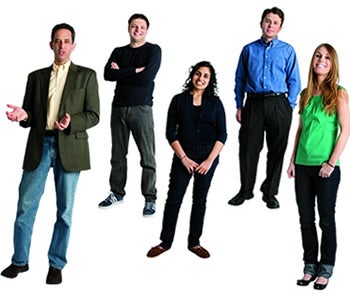This fall, Professor John Goldberg, a tort law specialist at Harvard Law School, unexpectedly found himself engaged in a research project that could impact the lives of thousands of Americans. And it needed to be completed in a matter of weeks.
It started with a phone call from Kenneth Feinberg, administrator of the Gulf Coast Claims Facility, the $20 billion fund set up by BP after the Deepwater Horizon oil spill in the Gulf of Mexico to compensate those who had lost property, jobs and income because of the spill.
“There are no standing legal rules for how a fund like this needs to be set up.”
John Goldberg
[pull-quote author=”John Goldberg” content=”There are no standing legal rules for how a fund like this needs to be set up.” float=”right”]
“When you think of an oil spill, you think of beaches being soiled,” says Goldberg. “But not surprisingly there are ripple effects.” Feinberg had already been contacted by people from far outside the Gulf Coast region claiming to have lost income because of the spill.
“There are no standing legal rules for how a fund like this needs to be set up,” says Goldberg. “And one of the most important and difficult things Mr. Feinberg is asked to do is figure out who among all those claiming injury would be eligible for compensation.”
For guidance in setting up the BP fund, Feinberg wanted to know who would be eligible to recover for economic loss if, instead of applying to the fund, they took their case to court.
That’s where Goldberg came in, along with five HLS students he turned to for assistance. Working together, they provided in very short order a detailed analysis of the scope of legal liability for economic loss in connection with the oil spill, based on state and federal law, especially the Oil Pollution Act of 1990.
“It was heartening to see…(Feinberg’s) drive to figure out what the law is and what is fair.”
Benjamin Mundel ’12
Goldberg says the students who assisted him were “fabulous.” Without them, the quick turnaround simply would not have been possible. And as a professor of torts, Goldberg found the issues fascinating ones to explore with his assistants, all of whom had been students in his first-year Torts or Criminal Law courses. What was at stake, says Goldberg, was “an old problem as far as the law of torts is concerned”: who gets to recover for economic losses allegedly caused by someone’s careless actions, “but in a modern and politically salient context.” After the Exxon Valdez oil spill, Congress enacted OPA “out of dissatisfaction with existing tort law,” he says. “The whole point of OPA,” he continues, “was to enable more oil spill victims to recover than could traditionally recover under judge-made common law principles.”
The traditional rule, he explains, holds that someone who suffers lost profits can’t recover for that loss unless it is the result of physical damage to property that she owns or leases. OPA, by contrast, extends liability. For example, under the statute, a fisherman who is employed by the owner of a boat damaged by the spill can recover his lost wages from a person responsible for a spill, even if the fisherman has no property interest in the boat.
“The statute clearly contemplates some connection between economic loss and property damage, but not ownership or rental. So what is the connection?” Goldberg asks. “Congress never said, at least not explicitly. Our job was to solve that mystery.”
The report reviews a wide range of possible claimants, and in the end, Goldberg concluded that to recover under OPA, an individual needs to have suffered economic loss because of damage to property on the use of which her business relies. For example, a hotel owner whose business abuts a sullied beach ordinarily used by its customers should be able to recover, even if the hotel owner doesn’t own or lease the beach.
Goldberg stresses that his analysis is not binding on anyone, including Feinberg, and that “a judge tomorrow could say that we got the statute wrong.” But he adds that, under any plausible interpretation of OPA, a large number of people who actually suffered economic loss will not be able to recover because their losses are too remote from the spill.
One of the highlights of the project for Goldberg and his assistants was the opportunity to meet with Feinberg in person. The team spent an hour in Goldberg’s office discussing its research and findings, with Feinberg vigorously pressing all of them to defend and clarify their analysis.
Benjamin Mundel ’12, one of the five students working on the project, says it was a great educational experience to apply “the legal skills we’d learned in class to something that affected a lot of people and that we heard about on the news every day.”
Getting to discuss their work with “the man the government calls whenever they need to figure out how to compensate those injured in a national disaster,” says Mundel, also made a strong impression. “It was heartening to see firsthand his integrity and compassion for those affected by the oil spill and also his drive to figure out what the law is and what is fair.”
